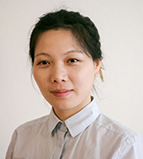Magnetism in van der Waals Heterostructures: Graphene/CrSe and WTe2/Fe3GeTe2

Speaker: Yingying Wu
Affiliation: Ph.D. Candidate
Via Zoom: https://us02web.zoom.us/j/9804104866?pwd=aXZmNUZMRDRKR0RVSmVPc1cyUXk0UT09
Meeting ID: 980 410 4866 – Passcode: 8YYe27
Abstract: Magnetism in layered van der Waals material has a huge potential for applications in ultracompact and spintronic devices. In this talk, we focus on two projects, one is about inducing magnetism into monolayer graphene, and the other one is modifications of the intrinsic magnetism in Fe3GeTe2.
Although layered materials like graphene are not inherently spin-polarized, magnetic proximity effect-induced spin splitting has been identified as an effective way to experimentally realize the magnetism in monolayer graphene coupled an underlying antiferromagnet. In this graphene/antiferromagnet structure, exchange splitting energy as large as 134 meV at 2 K has been obtained. This exchange splitting energy can be modulated through field coolings, increasing with the positive field coolings and decreasing with negative ones, which is reflected through the shifted quantum Hall plateau and quantum oscillations in graphene. Apart from the induced magnetism into graphene from the proximity effect, the interface-induced Dzyaloshinskii-Moriya interaction and Néel-type skyrmion lattice have been confirmed in an intrinsic van der Waals ferromagnetic material Fe3GeTe2 coupled to 1T’-WTe2 with strong spin-orbit interaction. The large interfacial Dzyaloshinskii-Moriya interaction at the interface is estimated to have a large energy of 1.0 mJ/m2. Transport measurements and Lorentz transmission electron microscopy show the consistent result on the skyrmion size. These works open a field for the applications of van der Waals heterostructures to electronic and spintronic devices.
Biography: Yingying Wu has obtained her undergraduate degree in Physics in 2014 from Nanjing University and a master degree in Physics in 2016 from the Hong Kong University of Science and Technology. After that, she joined Device Research Lab in University of California, Los Angeles for her PhD degree in Electrical and Computer Engineering under the guidance of Dr. Kang L. Wang. Her research interest includes Quantum Computing, Spintronics and Magnetism, Superconductivity and Nanoelectronics.
For more information, contact Prof. Kang L. Wang (wang@ee.ucla.edu)
Date/Time:
Date(s) - Oct 20, 2020
4:00 pm - 6:00 pm
Location:
Via Zoom Only
No location, Los Angeles
Map Unavailable
